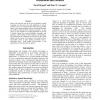Free Online Productivity Tools
i2Speak
i2Symbol
i2OCR
iTex2Img
iWeb2Print
iWeb2Shot
i2Type
iPdf2Split
iPdf2Merge
i2Bopomofo
i2Arabic
i2Style
i2Image
i2PDF
iLatex2Rtf
Sci2ools
119
click to vote
FLAIRS
2007
2007
A Model for Qualitative Spatial Reasoning Combining Topology, Orientation and Distance
Much work has been done in the area of qualitative spatial reasoning over the past years, with application in various domains. However, existing models only capture particular aspects of the spatial relations between objects and therefore are unable to represent these relations accurately. In this paper, we draw together two existing approaches to provide a calculus taking into account topology, orientation and distances, while keeping in mind cognitive considerations. Provided that some constraints are imposed on the spatial objects and the frame of references, our model has been successfully tested to infer implicit constraints from a knowledge base. With further improvements, it has applications to GISs and robot navigation.
Artificial Intelligence | FLAIRS 2007 | Qualitative Spatial Reasoning | Spatial | Spatial Relations |
| Added | 02 Oct 2010 |
| Updated | 02 Oct 2010 |
| Type | Conference |
| Year | 2007 |
| Where | FLAIRS |
| Authors | David Brageul, Hans W. Guesgen |
Comments (0)

